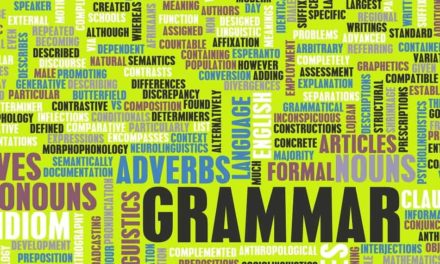Verbal Agreement for Difficult Nouns & Pronouns
Although most nouns and pronouns in the English language are relatively straightforward when it comes to choosing the correct form of verb to establish agreement of person and number, there are certain nouns and pronouns that can prove extremely frustrating. Many of these are used frequently by academics and scientists when reporting the details of advanced research for publication, so scholarly authors often find it necessary to determine the correct verb forms when using these tricky nouns and pronouns. The following usage notes focus on choosing between singular and plural verbs and may be helpful if you are tackling any sentences in which achieving agreement between subject and verb is proving particularly difficult.
• Certain third-person pronouns in English are always grammatically singular. Some of these seem logically singular in most situations: ‘anyone,’ ‘each,’ ‘neither’ and ‘nobody’ are good examples. Others express what appears to be a plural concept – ‘everybody’ and ‘everyone,’ for instance – and might theoretically require a plural form of the verbs that apply to them. In all cases, however, a singular verb is correct: ‘Each of the researchers conducts a separate trial’ uses ‘conducts,’ the third-person singular of ‘to conduct,’ to agree with ‘each,’ not the plural form to agree with ‘researchers’; ‘Neither wins in such situations’ uses ‘wins,’ the third-person singular of ‘to win,’ to agree with ‘neither,’ while ‘Everybody goes to the park on the weekend’ uses ‘goes,’ the third-person singular of ‘to go,’ in agreement with ‘everybody.’
• Some nouns have a plural form, ending in an ‘s,’ but they nonetheless agree with a singular verb. Certain scholarly disciplines and fields of study are among these, such as ‘mathematics’ and ‘medieval studies,’ so ‘Mathematics is a fascinating field of study’ correctly uses ‘is,’ the third-person singular of ‘to be,’ to agree with ‘mathematics.’ A common example is found in the noun ‘news.’ Whether it is the formal news presented on television and via other media or personal news between neighbours, it is an essentially plural noun that is almost always used with a singular verb. ‘The news is bad,’ ‘There was good news at last’ and ‘The morning news contradicts what I heard last night’ all use the third-person singular: ‘is’ and ‘was’ are the present and past forms of ‘to be,’ while ‘contradicts’ is the present of ‘to contradict.’
• Certain nouns with a plural form are sometimes used with a singular verb and sometimes with a plural one, and the change can alter the meaning. Circumstances and details vary among these words, but a few examples might be helpful. ‘Series’ is both the singular and the plural form of that word, so using it with a singular verb makes it a singular concept. In ‘A series of trials takes place every Thursday,’ ‘takes’ is the third-person singular of ‘to take,’ so the concept is singular, which is also indicated by the article ‘a.’ In ‘There are now three new series of that journal,’ on the other hand, ‘are’ is the third-person plural of ‘to be,’ so the concept is plural, with the exact number indicated by ‘three.’ A different example is provided by monetary designations such as ‘dollars’ and ‘pounds.’ When used with a specific amount of money, these terms take a singular verb, but when used alone, they take a plural verb. For example, ‘Six pounds was all I received for my efforts’ and ‘Dollars are the preferred currency’ are both correct, although ‘was’ is the past singular of ‘to be,’ while ‘are’ is the present plural. As a final example, ‘United Nations’ used with a singular verb indicates the international organisation, but when it is used with a plural verb, the nations themselves are intended, and this applies to the initialism ‘UN’ as well: ‘The UN is in New York City,’ but ‘There are many United Nations.’
• Finally, there are certain nouns that represent objects that consist of two parts, so the nouns take a plural form and also a plural verb. ‘Trousers’ and ‘pants’ are good examples. One garment is indicated by each, but each garment has two legs, and it is that duality that rules the verb: ‘My trousers are far too tight’ correctly uses the third-person plural ‘are.’ ‘Scissors’ and ‘tweezers’ are the same, each being a single object but taking a plural verb, so ‘Those scissors cut thick paper well’ uses the plural ‘cut’ rather than the singular ‘cuts’ of the verb ‘to cut.’
You might be interested in Services offered by Proof-Reading-Service.com
Journal Editing
Journal article editing services
PhD Thesis Editing
PhD thesis editing services
Expert Editing
Expert editing for all papers
Medical Editing
Medical Editing Services
Research Editing
Research paper editing services
Book Editing
Professional book editing services
















